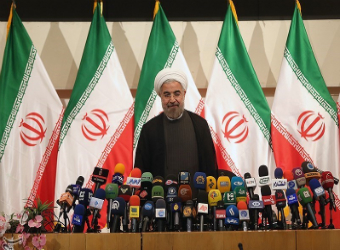People in the Middle East will lose sleep over a nuclear deal between global powers and Iran, a Saudi foreign policy adviser said on Sunday, signalling the deep unease Sunni Muslim Gulf states have over Western rapprochement with their Shi’ite foe.
At the time the adviser spoke, Saudi Arabia had not officially responded to news of the deal under which Western countries will ease sanctions in return for curbs on Iran’s nuclear programme. Riyadh has frequently called for Washington to maintain a tough line with Tehran.
Abdullah al-Askar, chairman of the foreign affairs committee in Saudi Arabia’s appointed Shoura Council, a quasi-parliament that advises the government on policy, stressed that he had no knowledge of his government’s official response but was personally worried.
“I am afraid Iran will give up something on [its nuclear programme] to get something else from the big powers in terms of regional politics. And I’m worrying about giving Iran more space or a freer hand in the region,” he said.
“The government of Iran, month after month, has proven that it has an ugly agenda in the region, and in this regard no one in the region will sleep and assume things are going smoothly,” Askar said.
In the hours before Sunday’s deal was sealed, Gulf Arab leaders, including Saudi King Abdullah and the rulers of Qatar and Kuwait, met late on Saturday night to discuss “issues of interest to the three nations”.
The Gulf Arab rulers, all Sunni Muslims, are enemies of Shi’ite Iran, which backs Syria’s President Bashar al-Assad in a civil war in which they back the rebels. They have accused Tehran of fomenting unrest in a range of countries including Yemen, Bahrain, Lebanon and Iraq. Iran denies such meddling.
ACCOMODATIONS
“The people of the region know Iranian policies and Iranian ambitions. And they know thatIran will interfere in the politics of many countries in the region,” Askar added.
In recent months Saudi Arabia has grown increasingly anxious about Washington’s apparent willingness to deal with Iran’s new President Hassan Rouhani and complained about President Barack Obama’s reluctance to take tougher action in Syria’s civil war.
Robert Jordan, a former U.S. ambassador to Riyadh, said the Saudis could be even more worried about Iran gaining influence in the region than about it obtaining an atomic bomb.
“The deal may relieve the Saudis of having to worry they would have to counter a nuclear threat from Iran, but it doesn’t counter their geopolitical worries which may be more profound,” said Robert Jordan, U.S. ambassador to Riyadh from 2001-03.
“This deal doesn’t address the conduct of Iran with regard to the Middle East and therefore may suggest a willingness to reach broader accommodations with Iran that the Saudis would view as not in their best interests,” said Jordan.
Early this month Secretary of State John Kerry visited Riyadh and said he had given assurances to King Abdullah and others about U.S. talks with Iran, and pledged to keep Riyadh abreast of developments “so that there are no surprises”.
Foreign Minister Prince Saud al-Faisal said at the time: “We accept the assurance of the secretary that they will not allow the development of weapons – of atomic weapons in Iran”.
Askar said that if the deal did not succeed in preventing Iran from building a bomb, Saudi Arabia and other countries would probably seek one too.
“I think Saudi Arabia will go ahead if Iran goes ahead [and gets a nuclear weapon]. I think Egypt, maybe Turkey, Saudi Arabia, maybe the Emirates, would go ahead and acquire the same technology. This will open the door widely to weaponisation.”
Source: Reuters
